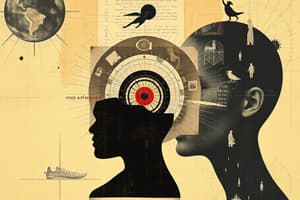Podcast
Questions and Answers
What is the main purpose of the conscious mind in human psychology?
What is the main purpose of the conscious mind in human psychology?
- Helping solve problems and make decisions (correct)
- Executing preformed routines
- Playing a significant role in learning new information
- Conserving energy by reducing reliance on decision making
Which of the following is NOT an example of an unconscious process mentioned in the text?
Which of the following is NOT an example of an unconscious process mentioned in the text?
- Riding a bike
- Breathing
- Learning new information through conditioning (correct)
- Speaking fluently
Why does the unconscious mind handle routine skills according to the text?
Why does the unconscious mind handle routine skills according to the text?
- To help conserve energy by reducing decision making
- Because these skills require too much attention when fully aware (correct)
- To enhance self-understanding and productivity
- To remember events from past experiences
In the context of the text, what is the significance of the interplay between conscious and unconscious activities?
In the context of the text, what is the significance of the interplay between conscious and unconscious activities?
What role does conditioning play in the context of the unconscious mind according to the text?
What role does conditioning play in the context of the unconscious mind according to the text?
Flashcards are hidden until you start studying
Study Notes
Awareness Levels: Conscious vs Unconscious Processes
Awareness is the ability of our mind to perceive information from both external sources like sensory input and internal cues such as thoughts and feelings. This perception allows us to interact with our environment effectively by making choices based on what we know. Despite its importance in our daily lives, awareness itself is complex and can operate at different levels. In this context, there are two main types of awareness: conscious and unconscious processes. We will explore each type separately before discussing their relationship.
Conscious Processes
Conscious processes refer to mental activities that you have direct control over. These are essentially the things that happen when your attention is focused on something specific. For instance, while driving, you might pay close attention to where you're going, how fast you're moving, and whether other cars around you are following traffic rules. All these actions require active concentration because they involve immediate response and heightened alertness. Examples of conscious processes include reading a book, listening to music, eating, talking to someone, painting a picture—they all rely on intentional focus.
Unconscious Processes
Unconscious processes, also known as automatic or non-volitional responses, occur without conscious intention. These operations take place below the level of awareness; our brain executes them using preformed routines that don't need constant monitoring. They form habits and reflexes which help conserve energy by reducing reliance on continuous decision making. Examples of unconscious processes are breathing, walking, speaking fluently, playing a well-practiced instrument, riding a bike, walking along familiar routes, writing quickly—all these tasks become second nature due to repetition.
So far, it seems clear that conscious and unconscious processes play distinct roles in our everyday lives. Yet, understanding their interaction adds another layer of complexity to how awareness works within ourselves.
Interplay Between Conscious and Unconscious Processes
While most people think of consciousness as being opposed to unconsciousness, some researchers argue that one cannot exist without the other. Both states serve vital functions in human psychology. The conscious mind helps us make decisions, solve problems, set goals, create plans, remember events from past experiences or imagine future outcomes. On the other hand, the unconscious mind deals with routine skills that would consume too much attention if performed while we were fully aware of them. It also plays a significant role in learning new information through conditioning and repetition.
The interplay between conscious and unconscious activities suggests that although we may not always notice every nuance happening inside our heads during any given moment, our minds remain highly engaged in processing data and responding accordingly. Therefore, becoming more attuned to these various levels could enhance personal growth, self-understanding, and productivity.
Studying That Suits You
Use AI to generate personalized quizzes and flashcards to suit your learning preferences.




